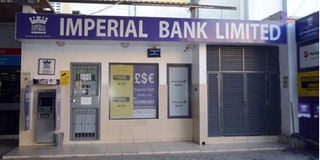CMA goes after eight Imperial Bank directors in Sh2bn fraud

Imperial Bank's branch in Likoni, Mombasa County in this picture taken on October 14, 2015.
In October 2015, the Central of Kenya (CBK) jolted the financial markets when it placed Imperial Bank under receivership after a Sh34 billion hole was discovered at the tier-two bank.
As the decision was being taken, all attention shifted to individuals and moneyed institutional investors who had deposited billions of shillings in the lender. But there was another group, who had been duped to advance the bank some Sh2 billion through a dubious bond that caused the most pain, as recovering the money was a near impossibility.
Despite knowing that the bank was going down, it's board members failed to report the financial statements fraud to the Capital Markets Authority (CMA) and the investing public when it came to their knowledge on September 21, 2015, a day before the bond was allotted to the bondholders.
Six years down the line, the CMA has finally started enforcement hearings of the directors of the collapsed medium-sized bank, after investors lost Sh2 billion.
The regulator says it has commenced the proceedings against former board members of the bank for their failure to provide oversight in the preparation, approval and publication of the Information Memorandum for the Sh2 billion medium-term note issue.
Billions of shillings lost
But this may be too little, too late, given that the bank collapsed with billions of shillings of investors and depositors’ funds on top of the Sh2 billion.
CMA says that only Christopher Diaz, a former independent and non-executive board member, who served between February 1, 2015 and October 13, 2015, attended the enforcement hearings before an ad hoc committee of the CMA Board to respond to the allegations.
"Having considered his written and oral submissions, the committee of the CMA board did not take any enforcement action against Mr Diaz, who had been newly appointed as an independent and non-executive board member when the bond raising process was already underway," CMA said in a statement.
The other former IBL board members declined to appear before the committee and filed an appeal at the Capital Markets Tribunal.
Members of the Ad hoc Committee were Dr Thomas Kibua (CMA board member), John Birech (CMA board member), Rtd Chief Justice Willy Mutunga, FCPA Dr James McFie and FCPA Anne Eriksson and Patricia Kiwanuka.
Court proceedings
Efforts by the CMA to undertake the IBL bond enforcement proceedings had been delayed by court proceedings in 2016 at the High Court filed by the former IBL directors and which culminated in Supreme Court Petition No. 29 of 2019, Alnashir Popat & 8 Others vs Capital Markets Authority.
The eight directors, including Mr Popat, Omurembe Iyadi, Jinit Shah, Anwar Hajee and Hanif Somji, argued that Section 11(3)(cc) & (h) of the CMA Act is unconstitutional, because it allows the regulator overlapping roles.
The CMA went after the directors on grounds that they abetted fraud and breached the fiduciary duty to depositors.
In its judgement delivered on December 11, 2020, the Supreme Court allowed the CMA to proceed with its enforcement proceedings through its delegated authority under Capital Markets Act.
In compliance with the Supreme Court ruling, the authority constituted an Ad Hoc Committee on January 28 to conduct the enforcement proceedings.
IBL applied for the issuance of a Sh2 billion medium-term note on April 30, 2015, which was approved by CMA on 12 August 2015.





